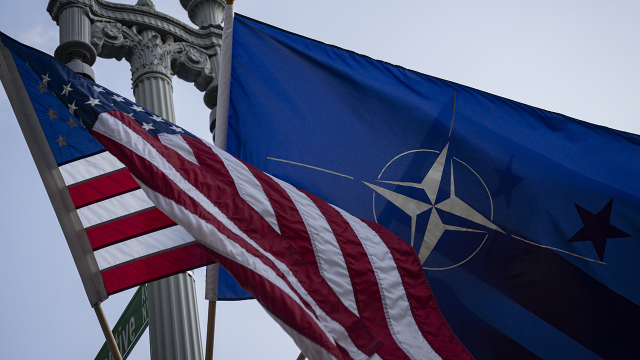
Americans remain largely divided along partisan lines over U.S. aid to Ukraine, nearly three years after Russia’s military invasion.
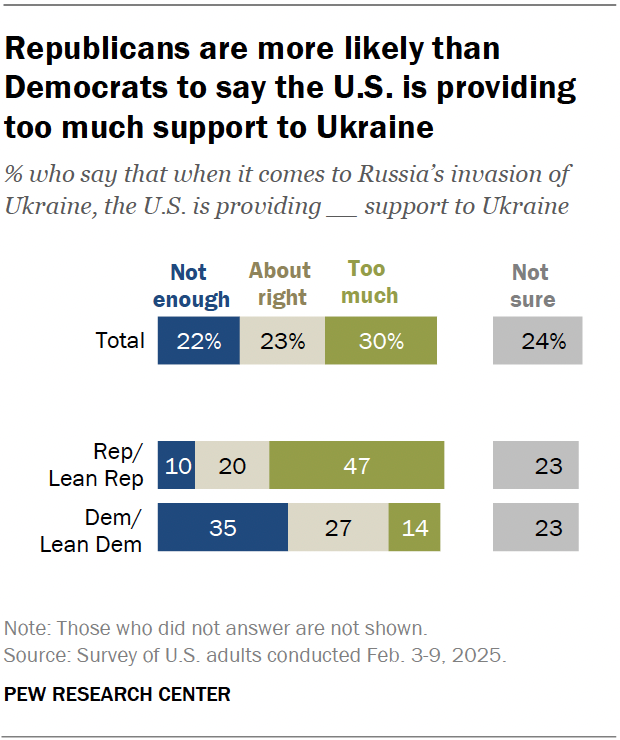
Republicans and Democrats also differ widely over whether the United States benefits from NATO membership and whether European countries are spending enough on their own defense, according to a Pew Research Center survey conducted Feb. 3-9, 2025.
Note: This survey was fielded prior to President Donald Trump’s phone call with Russian President Vladimir Putin and Secretary of Defense Pete Hegseth’s comments on Ukraine’s accession to NATO.
Views of U.S. support for Ukraine
Overall, 30% of American adults say the U.S. is providing too much support to Ukraine in its war with Russia. That’s up slightly from 27% in November 2024, just after the U.S. presidential election. At the same time, the share of adults who believe the U.S. is not providing enough support to Ukraine has increased slightly: 22% say this, up from 18% in November. These shifts mean that U.S. opinion about support for Ukraine is now closer to preelection levels.
About one-in-five Americans (23%) say the level of U.S. support for Ukraine is about right, down slightly from 25% in November. Another 24% say they are not sure, down from 29% over the same period.
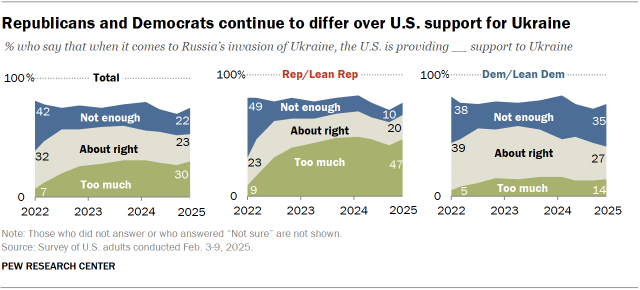
Republicans and Republican-leaning independents are far more likely than Democrats and Democratic leaners to say the U.S. is giving Ukraine too much support (47% vs. 14%). The share of Republicans who think the U.S. is giving Ukraine too much support has increased 5 percentage points since November. Meanwhile, Democrats are much more likely than Republicans to say the U.S. is giving too little support to Ukraine (35% vs. 10%); the share of Democrats with this view is up 7 points since November.
Among Republicans, a plurality across age groups say the U.S. is giving too much support to Ukraine. But among Democrats, adults under 30 are about as likely to say the U.S. is not giving enough support to Ukraine (28%) as they are to say it’s giving the right amount of support (27%). Older Democrats are much more likely than their younger counterparts to say the U.S. is not providing enough aid to Ukraine.
Views on how support for Ukraine affects U.S. national security
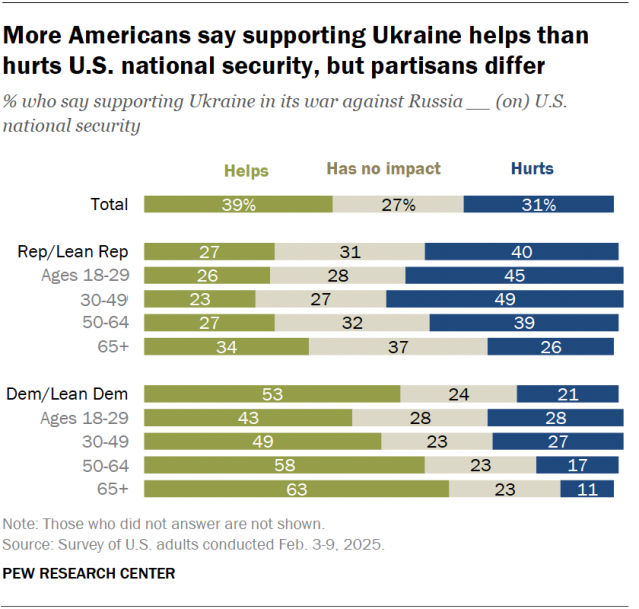
About four-in-ten Americans (39%) say supporting Ukraine in the war against Russia helps U.S. national security. This is higher than the share who say it hurts U.S. national security (31%) or has no impact (27%).
Slightly more Americans now say supporting Ukraine helps U.S. national security than said this when we last asked in April 2024 (39% today vs. 36% then). However, there continue to be wide partisan differences on this question. Democrats are much more likely than Republicans to say supporting Ukraine helps U.S. national security (53% vs. 27%). Conversely, Republicans are far more likely than Democrats to say it hurts national security (40% vs. 21%).
Democrats and Republicans also differ by age on this question. While 63% of Democrats ages 65 and older say aiding Ukraine helps U.S. national security, the share falls to 43% among Democrats under 30.
For their part, Republicans under 30 are more likely than those ages 65 and older to believe this support for Ukraine hurts U.S. national security (45% vs. 26%). Older Republicans are more likely than Republicans of other ages to say supporting Ukraine has no impact on domestic security.
Views of U.S. membership in NATO
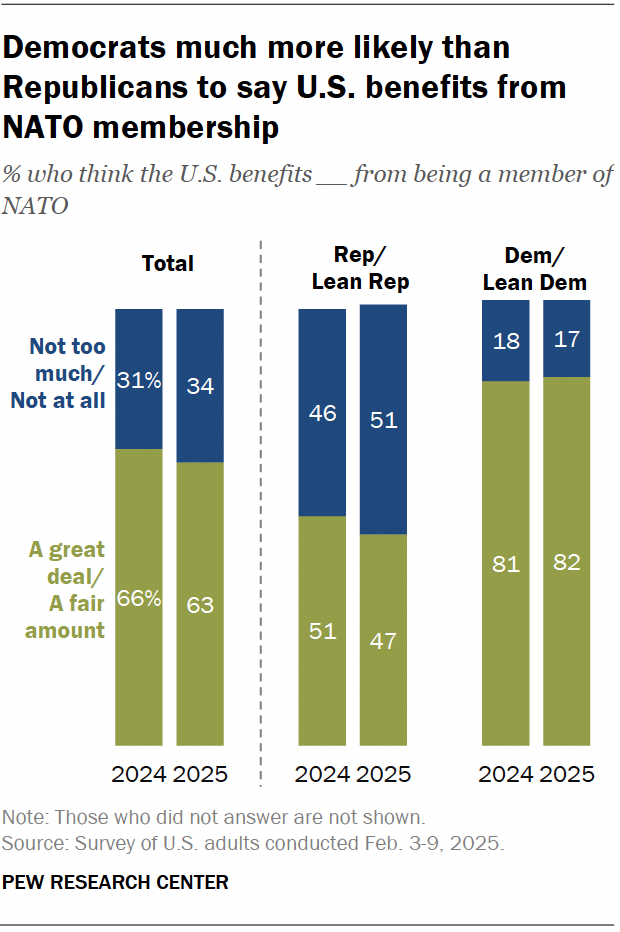
More adults say the U.S. benefits a great deal or a fair amount from NATO membership (63%) than say it does not benefit too much or at all (34%).
Still, this reflects a decline in positive views since the April 2024 survey, when 66% said the U.S. benefited from being a NATO member.
Republicans, in particular, are less likely to see benefits from NATO membership today than last year. Fewer than half of Republicans (47%) now say the U.S. benefits from being a member of NATO – down from 51% last year and the lowest percentage since we started asking this question in 2021. Democrats’ views of NATO membership have remained largely unchanged: About four-in-five have said the U.S. benefits from being part of NATO since 2022.
Views of European national defense spending
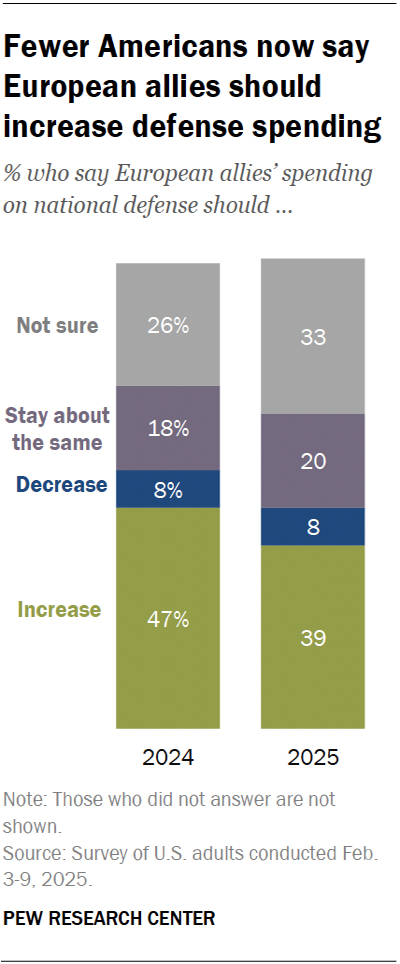
President Donald Trump has consistently called for European countries to increase their spending on defense.
About four-in-ten U.S. adults (39%) say European allies should increase their defense spending. That’s down from 47% in April 2024. Another 20% say European defense spending should stay about the same, and 8% say it should decrease. A third of Americans (33%) say they are not sure, up from 26% last year.
Republicans are much more likely than Democrats to say European allies should increase defense spending (50% vs. 30%). Notably, fewer Republicans and Democrats alike say this now than in 2024.
Americans ages 65 and older have been consistently more likely than younger adults to say European allies should increase their defense spending. However, fewer Americans in every age group say this now than said so last year.
Note: Here are the questions used for this analysis, along with responses, and its methodology.
